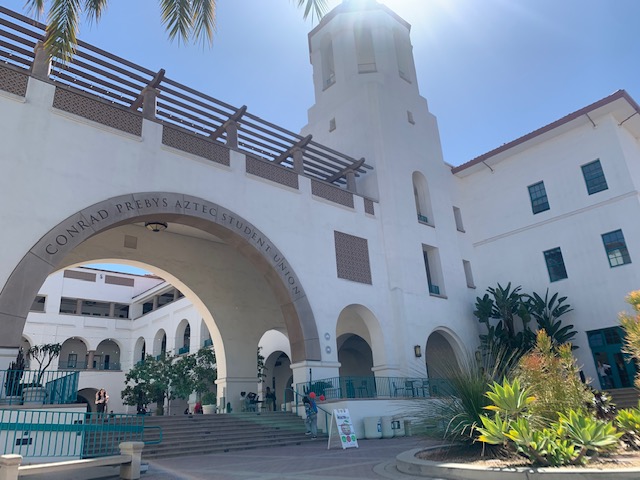When first formed in the fall of 2019, the San Diego State Presidential Task Force set out analyze how alcohol and drug use plays a role in the college student experience.
This group was formed after the death of freshman Dylan Hernandez in fall 2019, and some changes they’ve made include implementing the Amnesty policy and Good Samaritan policy, hiring a Fraternity and Sorority Life Director and putting more efforts in expanded Aztec Nights events to discourage drinking and partying among students.
“Our goal is not just to punish,” Director for Student Rights and Responsibilities Lee Mintz said. “We don’t want to punish. It’s not a punitive process, it’s an educational process. When we meet with students, we want to understand the ‘why.’”
The Amnesty policy was implemented in April 2021 and it allows students to get help for themselves or others without the fear of receiving disciplinary sanctions through the SDSU conduct process.
The Good Samaritan policy removes conduct penalties for certain alcohol and other drug violations. This applies when a student organization seeks timely assistance from appropriate emergency personnel and SDSU staff for any student impacted by alcohol or other drugs at a student organization activity.
Generally, students reporting incidents of sexual violence or hazing, or calling for medical assistance for alcohol or other drug-related incidents will not be subject to student conduct charges related to alcohol or other drugs, according to the university.
“Exceptions to this may include matters related to sexual violence (i.e., if a student sexually assaults a member of the campus community and then calls for assistance, if the victim needs medical assistance related to alcohol or other drugs – whether or not provided by the perpetrator, the perpetrator themselves will not receive amnesty), sales or distribution of alcohol or other drugs, physical assaults, and/or matters related to discrimination and harassment,” the university said, in an email. “Individual circumstances vary depending on the incident.”
This also does not include all exceptions to the Amnesty and Good Samaritan policies.
“Our first priority is making sure that people are safe,” Mintz said. “If you’re the person that reports, or you’re the person that gets help for yourself or others, you won’t be in violation of university policy.”
The university has seen an increase in reportings from individual students, according to the Hazing Prevention Task Force Co-Chairs Mintz and Caryl Montero-Adams
“I don’t think the number of incidents have increased,” Mintz said. “I think that people are reporting more because they’re more comfortable knowing that they’re not in jeopardy of getting their friend in trouble.”
The Presidential Task Force currently has vacancies for Student Representative positions, Fraternity and Sorority Life Advisor, a University Senate Representative and a University Police Department Representative.
Students have been attending task force meetings and more students have been invited to participate, according to the university. SDSU also plans to engage advisors, the University Senate, and the San Diego State University Police Department to identify representatives for the upcoming year.
The Fraternity and Sorority Director will lead the Fraternity & Sorority Life team and the standalone center, which is planned to open in the coming months, according to the university. A national search firm is being used for the recruitment process of this position.









